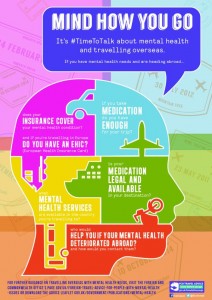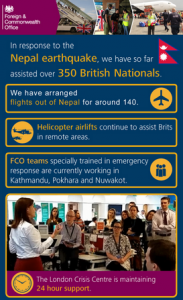Alongside work to protect Britain’s national security and support British business, consular work - providing help to British citizens abroad - is one of the most important things the Foreign and Commonwealth Office does. Not a lot of people associate the Foreign Office with front line delivery of public services. But we do, and we take it very seriously.
Shortly after I started as Foreign Office Consular Director, one Ambassador said to me – that whatever else was going on in his country, it was the thought of a difficult consular crisis that kept him awake at night.
So what is consular work? We’ll provide you with an emergency passport if yours is lost or stolen. We’ll visit you in hospital or prison and put you in touch with organisations which can help you. We provide travel advice if you’re looking to travel to a particular country. We’ll support you and your family if you have been injured abroad, become ill or have been assaulted. You can get in touch with us by phone at any time, from anywhere, 365 days a year.
There are limits, I’m afraid, to what we can do – we can’t change foreign legal systems, for example. But we try hard to provide a good service (take a look here at our commitments to the British public) and we do a lot of it. Last year, Foreign Office consular staff took over 470,000 enquiries, dealing with nearly 90,000 contacts for assistance around the world. Nearly 5,000 of these were from people who had been arrested. We provided support to grieving families following over 3,600 deaths abroad. We issued nearly 40,500 emergency passports.

We have to deal with increasingly complex and challenging issues, such as mental health as a growing trend, deaths overseas including murder and manslaughter, rape and sexual assault. And forced marriages. I've seen for myself how the staff respond to these - painstaking and careful communications with women and men who have been forced into a marriage against their will, often culminating in an early morning rendez-vous to bring them into a shelter before helping them leave the country. If you want to see more about this, a Panorama programme is available on BBC iPlayer.
We, the British public, are travelling more than ever before and to more distant and inaccessible places. One of our key services is to provide accurate and well-judged online travel advice which last year saw 28.9 million hits, an increase of 21% on the previous year. We’ve got a great social media offer too, using an expanding range of platforms to get our messages out: our dedicated Twitter account answers enquiries about travel in real time, while this video will raise a smile and conveys an important message. And if you want to see some of the more obscure requests that we get (how to cook haggis??), take a look at our gov.uk page.

And let's not forget crises. The Foreign Office plans and responds to all eventualities overseas - plane crashes, evacuations, natural disasters and terrorist incidents. We have learned and applied some very important lessons since the crises in Libya and Japan in 2011.

After the Nepal earthquake, the Foreign Office crisis team and volunteers operated out of our dedicated crisis centre for nearly two weeks. We sent staff to Kathmandu to help our Embassy team. Our local staff, despite their own lives having been disrupted, showed immense commitment in going out to hotels, hospitals and the airport to look for British citizens. We brought 120 people home overnight into Stansted airport, and took more by RAF plane to Delhi. We sent our rapid deployment teams with Gurkhas into difficult and challenging environments in remote mountainous areas to find British citizens. Our Embassy in Kathmandu exceptionally took in over 300 British people in the days immediately after the earthquake, providing food, water and shelter in tents.
Like many areas of public service, consular work attracts very high expectations and, sometimes, it is difficult to meet those expectations. But I’ve been struck by the dedication of Foreign Office consular staff around the world who strive to give a professional service to those who need it. It's a tough job dealing day in, day out with injury and death, crises, illness, kidnaps and more, and credit goes to our relatively junior staff for working often long and unsocial hours.
Over 70% of consular staff are from the country in which we employ them, where their local knowledge and language skills are critical to providing effective consular support. Consular staff need to develop the skills of a social worker, a bereavement counsellor, a police officer, a lawyer, a translator, a child protection officer and more. There are few jobs in Government where you can look back on your day and know that you have made such a difference to people’s lives.
Of course we don’t always get everything right. When things go wrong they often hit the headlines. But much of our work that does not make the press is good news. Seeing someone’s death penalty commuted after a protracted campaign of lobbying is an amazing result. Similarly, reuniting parents with their child after months apart or welcoming home a long-held hostage. We conduct marriage and civil partnership ceremonies around the world. What can seem like a relatively straightforward transaction, such as issuing an emergency passport, can make all the difference to someone stranded overseas.
If we get our work right, we might get a letter or email of thanks. When we don’t, we may get a bad story in the press and Ministers are rightly asking questions. We take feedback seriously, as we always want to know how to do better. We receive many more compliments than complaints: 256 complaints last year but nearly 1,350 compliments, including the rather nice "Completely unprompted, …[MP] said that 'in all my dealings with the whole of government, the part I've been most impressed with is the FCO Consular Directorate.”
In the words of the FAC report published in November 2014: "The Consular Service provides vital help to British nationals in distress and is a lifeline in times of great need. It can be proud of its work."

2 comments
Comment by Nigel Chapman posted on
That is very reassuring but who can British business and entrepreneurs turn to in support of our ventures in overseas countries?
FCO and similar can surely encourage and advise incoming subjects the best routes to soft landings?
Comment by Christine dunworth posted on
Very interesting. Always curious. Amazing work cheers x